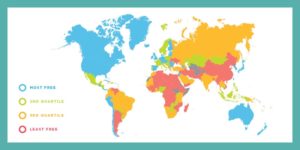
With all the proposals for hundreds of billions of dollars in new government spending and new taxes in the United States in recent days, there hasn’t been much good economic news.
Alexander C. R. Hammond, of the Institute of Economic Affairs (IEA) and of African Liberty, writes about it in “Africa Tries Free Trade,” Reason, April 2021. He writes:
On January 1, the long-awaited African Continental Free Trade Area (AfCFTA) came into effect. Aside from the economic benefits that the arrangement will bring to the continent, Africa’s newfound support for free trade and liberalization marks a clear rejection of the socialist ideology that has tormented African politics for decades.
In recent decades Africa has been the sick puppy of the six heavily populated continents. A glance at the Economic Freedom of the World map of economic freedom shows why. Over half of the 50+ African countries are in the least-economically-free quartile of the world’s 190+ countries. Not a single African country is in the top quartile. Hammond calls Nigeria, South Africa, and Egypt “regional economic powerhouses,” but of the three, only Nigeria is in the second-from-the-top quartile, South African is in the second-from-the-bottom quartile, and Egypt is in the bottom quartile.
One of the five measures of economic freedom is freedom to trade internationally. With AfCFTA, this will increase for many African countries.
This is a big, if slow, step toward freer trade.
Hammond writes:
Within 5–10 years, the AfCFTA will ensure that 90 percent of tariffs on goods traded between member states will be abolished. Within 13 years, 97 percent of all tariffs will be removed. By 2035, the World Bank has predicted, this enormous liberalization effort will boost Africa’s gross domestic product by $450 billion, increase wages for both skilled and unskilled workers by 10 percent, and lift more than 30 million people out of extreme poverty, defined as living on less than $1.90 per day. According to the same estimates, by 2035, the AfCFTA will see more than 68 million people rise out of moderate poverty, defined as living on $1.90–$5.50 per day. The “countries with the highest initial poverty rates,” the World Bank says, will see the “biggest improvements.”
Given Africa’s flirtation with socialism and protectionism from the 1960s through at least the 1980s, this is a welcome development.
For more on free trade agreements, see Douglas A. Irwin, “International Trade Agreements,” in David R. Henderson, ed., The Concise Encyclopedia of Economics.
UPDATE: Originally, I had claimed that NAFTA and USMCA are customs unions. A commenter below, Radford Neal, stated that I was incorrect. I consulted Doug Irwin, one of the top 5 or 10 trade economists in the United States, and it turns out that I was wrong and Radford Neal is right. So I made the appropriate change.


READER COMMENTS
Frank
Apr 1 2021 at 6:02pm
Good! And now let the EU lower its absurd rules of origin on imports from African countries with which it has so-called preferential [yes!] trade agreements.
Rich countries have not looked kindly on imports from African countries.
David Seltzer
Apr 1 2021 at 6:34pm
It’s a good start. Progress. Not perfection. Lets hope it continues!
David Henderson
Apr 1 2021 at 7:35pm
Frank, Good point.
David Seltzer, Exactly.
Mamadou Bah
Apr 2 2021 at 6:01am
Thank you for the article…
Radford Neal
Apr 2 2021 at 12:04pm
Why do you describe NAFTA and its successor, USMCA, as “custom unions”, with a common tariff on imports outside the group? I don’t think it’s true. As far as I know, under the USMCA (and NAFTA and the FTA before), nothing prevents Canada from eliminating all tariffs and other trade barriers with the rest of the world. (Under general WTO rules, if Canada eliminated tariffs on imports from the rest of the world, we’d have to eliminate them for Mexico and the USA too.)
Furthermore, as far as I know, tariffs on imports outside the group are not currently identical for the US, Canada, and Mexico.
Of course, NAFTA and the USMCA aren’t pure free trade agreements, having many exceptions and managed trade provisions. But describing them as “free trade” agreements seems closer to the truth than describing them as “custom unions”.
David Henderson
Apr 2 2021 at 11:04pm
Thanks, Radford. You are right. I’ve made the appropriate correction and update.
Radford Neal
Apr 3 2021 at 4:49pm
Thanks for the correction.
The linked Reason article doesn’t really make clear the nature of the new African agreement. From some browsing, it seems that maybe it’s presently a more-or-less free trade area, but with ambitions of becoming a custom union.
Of course, a custom union only makes sense if you plan on having tariffs with the rest of the world, so that ambition is unfortunate.
Mustafa Khanjiwala
Apr 3 2021 at 3:39pm
In Today’s Global Pandemic covid-19 and Everything that’s Happening, I wish and Would Definitely Like global Economical European and American and Indian Business Conglomerate To Come Forward And Expand Their Businesses through win win Solutions to Africa. More Trade than Aid. Africans Are great People looking Forward for Genuine Partners with Heart to Heal And Deal To Seal. Time Start Now. China Is Doing Great Job For Sure. Welcome to Africa ,Land Of Happening.
Comments are closed.